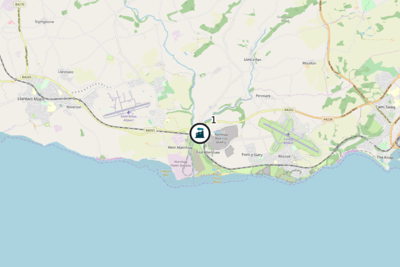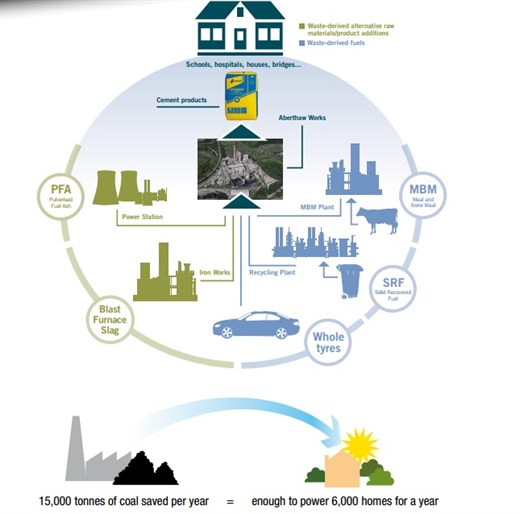Aberthaw Cement Kiln: Difference between revisions
m change tables |
mNo edit summary |
||
| Line 1: | Line 1: | ||
[[Aberthaw Cement Kiln]] is located in south Wales and is owned by [[Tarmac]]. | |||
{{CementKiln|EPR=BL3986ID|id=1}} | {{CementKiln|EPR=BL3986ID|id=1}} | ||
[[Category:Cement Kilns]] | [[Category:Cement Kilns]] | ||
Revision as of 15:22, 15 August 2022
Aberthaw Cement Kiln is located in south Wales and is owned by Tarmac.
| Aberthaw Cement Kiln | |
 See Cement Kilns → page for a larger UK Wide map. | |
| Waste Licence | BL3986ID |
| Operator | Tarmac |
| Parent Company | CRH plc |
| Clinker Capacity | 0.5 Mt |
Summary site information collated from a variety of sources.

Overview
WikiWaste has used the website Cement Plants and Kilns in Britain and Ireland[1] extensively for the reference material for each individual cement kiln page. The detail on this reference website is extensive and as WikiWaste is focused upon the UK waste and resource market, only the key highlights are captured from this website (and company websites accordingly) to provide background and context. Aberthaw started manufacturing clinker in May 1914 (with only Rugby being older in the UK) and up to 2015 had produced 33 million tonnes of clinker through 6 rotary kilns over this period.
Ownership
- 1912 to 1983 Aberthaw and Bristol Channel Cement Co. Ltd
- 1983 to 2001 Blue Circle
- 2001 to 2013 Lafarge
- 2013 to 2015 Lafarge Tarmac
- 2015 to Present CRH plc (owners of Tarmac)
The Process at Aberthaw
The following summary diagram is from Tarmac's website[2]:

Raw Materials
The primary raw materials are Blue Lias limestone and clay from the adjacent quarry and Carboniferous Limestone mainly from Glamorgan.
Waste Tonnage, EWC List
The table shows a list of the Waste for the Permit BL3986ID, that has arrived into sites as reported to the Regulator and then publicised in their reported statistics. The Data was last updated in Oct-23. The total reported tonnage arriving at the site was: 18,498t.
| EWC Code | Description | Tonnes In |
|---|---|---|
| 16 01 03 | end-of-life tyres | 5313.76 |
| 19 12 01 | paper and cardboard | 9310.1 |
| 19 12 10 | combustible waste (refuse derived fuel) | 3874.14 |
Waste Tonnage, By Origin
The table shows a list of the Waste for the Permit BL3986ID, that has arrived into sites as reported to the Regulator and then publicised in their reported statistics. The Data was last updated on Oct-23. The total reported tonnage arriving at the site was: 18,498t.
Where this tonnage exceeds that reported in year of the corresponding annual report, this may be due to the following reasons:
- Tonnage may have been received but not incinerated, i.e. the material is held pending incineration (the operator return to the EA reports as received whereas the annual report focuses on when the waste is incinerated.)
- Material may have been received into the site but treated in some other way than incineration.
- Material may have been received on the but transferred out of site for disposal/treatment at another site rather than incineration on the site.
| EWC Code | Origin of Waste | Tonnes In |
|---|---|---|
| 16 01 03 | Bristol, City of | 0.2 |
| 16 01 03 | Cardiff | 0.94 |
| 16 01 03 | Suffolk | 4940.44 |
| 16 01 03 | West Midlands | 372.18 |
| 19 12 01 | Blaenau Gwent | 2761.32 |
| 19 12 01 | Slough | 3319.96 |
| 19 12 01 | Surrey | 3228.82 |
| 19 12 10 | Blaenau Gwent | 2345.7 |
| 19 12 10 | Nottinghamshire | 1528.44 |
The schematic below from the Tarmac website shows a summary of how materials are used on site[3]:

The Pulverised Fuel Ash (PFA) and Blast Furnace Slag shown in the diagram are not classified as waste by the producer, but as a feedstock for cement production and so tonnages are not reported to the EA.
